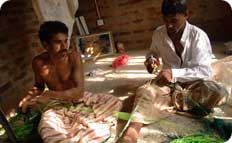Related projects
Related resources
 |
|
Risk Transfer & Private Sector Investment |

Two streams of activities
ProVention’s private sector focuses on two separate, although related, streams of activities. The first is a continuation of ProVention’s work in advancing risk transfer mechanisms that can be applied in developing countries. The second aims to further solidify disaster risk reduction as a cornerstone of corporate social responsibility (CSR) agendas where corporate involvement and investment in risk reduction are seen as a core component for both business continuity and new market development.
Risk Transfer
ProVention is working with the World Bank’s Commodity Risk Management Group to establish a Global Index Insurance Facility (GIIF) aimed at facilitating and co-financing access to index insurance and hedging products for developing countries. In partnership with the World Bank and other partners, including IIASA, ProVention is working to examine the feasibility and demand for GIIF at a country level. The GIIF potentially offers a unique approach to transferring risk of low-income countries through a multi-stakeholder framework involving governments, international and regional financial institutions, reinsurers and key disaster reduction actors.
Recognising that the poor seldom have access to insurance coverage, ProVention is also developing the potential of microinsurance as a tool for managing disaster risk. Microinsurance is the protection of low-income households or business against specific perils in exchange for regular monetary payments (premiums) proportionate to the likelihoods and cost of the risk involved. Such risk pooling allows many individuals or groups to share the costs of a risky event. Microinsurance is a growing field of practice attracting increasing interest from both the development community as a form of social protection and the insurance industry as a potential new product. The key challenges, therefore, are how accessible insurance is for the poor and how viable such schemes are from a commercial point of view. Moreover, to what extent can microinsurance contribute to reducing risk or provide an incentive for mitigation measures or behaviour?
To address these challenges, ProVention supports a pilot microinsurance scheme in India, ‘Afat Vimo’ implemented by the AIDMI, in parallel with a wider initiative undertaken by IIASA to research and analyse the viability of microinsurance experiences in responding to natural hazard risk. The viewpoint 'Invest to prevent disaster' is a preliminary discussion paper from IIASA as research continues on a more extensive study.
Corporate Social Responsibility
ProVention seeks to strengthen CSR for disaster risk management through studies and a round table forum. CSR is generally defined as being concerned with how business adds value to society as well as to its shareholders; how it acts as a partner in development; how it is accountable socially, environmentally and financially; and how it fulfils its responsibilities as a corporate citizen.
For businesses operating in disaster-prone regions, effective disaster mitigation can serve both core business interests, by reducing the risks of business interruption – lost production time, damage to facilities, legal liability, sudden losses and unexpected shocks, - and the interests of the society in which they operate. Core business activities need to factor disaster risk into planning and operations, not just those risks present for business but also the wider social and environmental risks for the local community as a result of business activities.
On the CSR agenda, a major challenge remains the lack of business incentives for investing in long-term reduction of natural hazard risk, While there is a strong case for minimising the risks businesses face in terms of their own facilities or production, the case for wider business involvement in measures to reduce the vulnerability of the communities in which they work or to which they sell their goods and services is still to be made.
